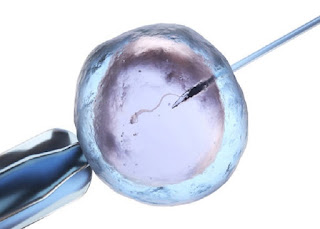Top 7 Commonly Asked Questions about IVF
IVF or In-vitro fertilization has been a game changer for couples who are unable to conceive a child. In the procedure, multiple eggs are stimulated to mature and are then retrieved. The egg retrieval process is usually done under light anesthesia and takes about 10 to 15 minutes to perform using a needle under ultrasound guidance. The process doesn’t require incisions and the recovery is fairly easy with mild bleeding and cramping being the most common symptoms post retrieval, and most patients can return to their normal routine the following day. Here are a few common questions people ask about the IVF procedure:
1. What is IVF?
In vitro fertilization (IVF) is
the most common type of assisted reproductive technology (ART), used to create
an embryo by bypassing certain causes of infertility. The procedure is
effective in cases of fertility issues such as mild sperm abnormalities in men,
and fallopian tube or ovulation irregularity in women.
During the procedure, a woman's
eggs are surgically retrieved and then fertilized in a laboratory by mixing
with a partner (or donor's) sperm. The fertilized egg, or embryo, is left to
grow for two to five days, and then surgically transferred back into the
woman's womb.
2. How long should you wait before consulting
a fertility doctor?
Patients generally seek advice
from a fertility doctor after one year of trying unsuccessfully to get
pregnant. The chances of a fertile couple conceiving a child in any given month
is around 20%; resulting in roughly ninety percent of couples becoming pregnant
after one year of trying to conceive.
It’s recommended that the
remaining 10 percent of couples consult a fertility specialist. Women over
thirty in particular are encouraged to undergo a fertility treatment
evaluation, after six months of attempting to conceive. Women over forty should
meet with a fertility doctor shortly after deciding to try and have a child.
3. Am I a candidate for IVF?
Several factors determine if a
patient is suitable for IVF treatment. Appropriate candidates who qualify for
IVF include couples who may experience:
·
Low sperm counts
·
Endometriosis
·
Problems with the uterus or fallopian tubes
·
Ovulation disorders
·
Sperm unable to penetrate or survive in the
cervical mucus
·
Other health or unexplained reproductive issues
The only way to know for sure if
in vitro fertilization is right for you is to undergo a complete exam and
consultation at the Center for Reproductive Endocrinology in Dallas, Texas.
4. How successful is IVF?
According to national statistics
from the CDC, the average IVF success rate using your eggs begins to drop
around age thirty and dips rapidly in the mid-30s and early 40s, due to lower
egg quantity and quality. The success rates at the Center for Reproductive
Endocrinology consistently beat the national average.
In addition to age, success rates
with IVF can vary due to other factors including one’s height, weight,
infertility diagnosis, sperm count, and reproductive history, such as the
previous number of pregnancies, miscarriages, and births.
5. Does IVF increase the chances of twins and multiple
births?
In the past, physicians
recommended transferring multiple embryos to improve the chances of fertility
since knowing which embryo was viable was hard to determine. This sometimes led
to multiple births. However, new advances like extended blastocyst culture and
PGS/CCS have made this practice less common.
Nowadays, most fertility
specialists advise against implanting more than one embryo at a time unless
indicated due to the potential health risks related to multiple births. Viable
embryos can also be frozen and stored for future use if people want children.
6. What are the potential side effects of
undergoing IVF?
Fertility medications can cause
mood swings, headaches, hot flashes, abdominal pain, and bloating. In very rare
cases, fertility medication may rarely induce ovarian hyper-stimulation
syndrome (OHSS), which can produce more severe symptoms such as nausea or
vomiting, shortness of breath, decreased urinary frequency, and more. Potential
side effects that can occur after IVF treatment may include:
·
Passing a tiny small amount of clear or blood-colored
fluid
·
Mild bloating
·
Mild cramping
·
Breast tenderness
·
Constipation
7. Are there any restrictions while undergoing
IVF?
Your doctor will recommend that
you adhere to the basic guidelines below during the IVF process and into your
pregnancy:
·
Smoking:
It’s recommended that both partners stop smoking at least three months before
beginning an IVF cycle, and before ovulation induction begins. Tobacco can have
toxic and harmful effects to a woman’s eggs.
·
Drinking:
You should avoid alcohol avoided from the start of IVF treatment and if
pregnant, until the birth of the child.
·
Medications:
You should inform your doctor if you’re taking any prescription or over-the-counter
medications. Some medicines can interfere with the prescribed fertility
medication or embryo transference.



Comments
Post a Comment